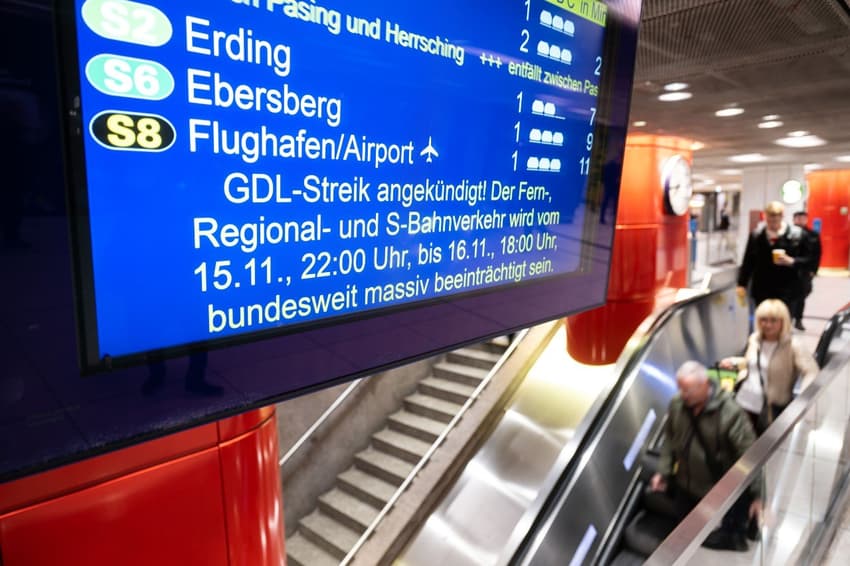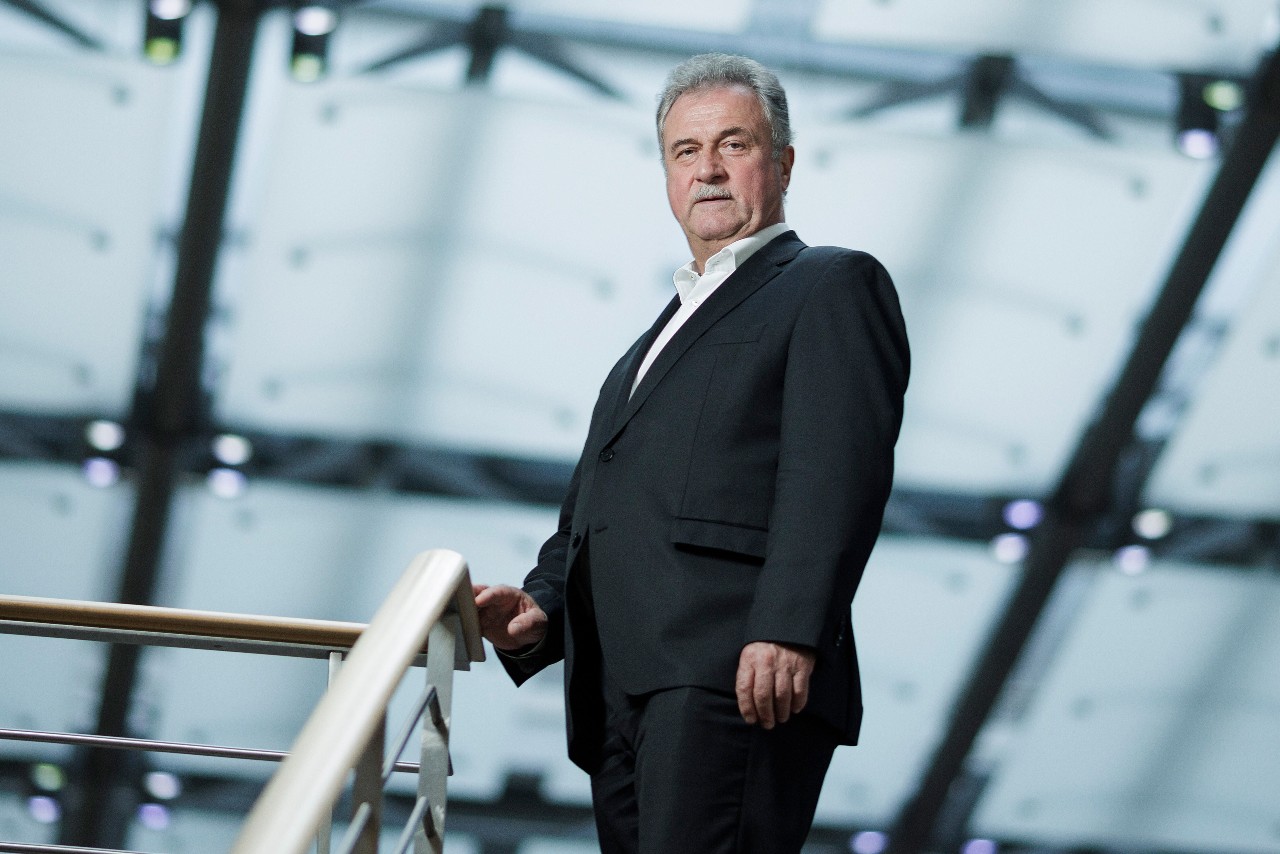Is Germany set for more train strikes in the weeks ahead?

A warning strike called by the German train drivers' union this week has raised the spectre of weeks of travel chaos in the run-up to Christmas. So just how close is the union to reaching a deal - and are more strikes on the horizon?
Just one round of talks had taken place between Deutsche Bahn and the GDL train drivers' union when the announcement came: the GDL was calling a national rail strike over two days from Wednesday to Thursday.
Since rail workers staged their walk-out on Wednesday at 6pm, long-distance, S-Bahn and regional rail services have been paralysed on a national scale.
Though Deutsche Bahn has claimed its emergency operations have run as planned, around 80 percent of long-distance train services were cancelled during the 20-hour strike, with "severe restrictions" around the country.
In some regions, local and regional S-Bahn trains stopped running entirely, the operator announced.
When ordinary service resumes at 6pm on Thursday, many commuters will be wondering whether this is just the start of weeks of disruption on Germany's rail network.
READ ALSO: 'No trains': Passengers in Germany hit by Deutsche Bahn's ongoing strike
In the worst-case scenario, this could include strikes over Christmas.
Are more strikes on the way?
This looks highly likely - though the question is when.
Unlike its larger counterpart the EVG, the GDL rail union has a reputation for being big and bold when it comes to strike action.
Speaking to DPA on Thursday, union leader Klaus Weselsky refused to rule out further strikes. "I can't do that at this point in time," he said.
At the start of the negotiations over pay and conditions, Weselsky had rejected proposals from Deutsche Bahn and Transport Minister Volker Wissing (FDP) for a "Christmas truce" that would rule out strikes over the festive period.
“We rejected that (truce) because we don’t know how things will develop, and because we don’t know how much negotiation we’ll have done by then,” he said.
Though no further strikes have been announced just yet, what's clear so far is that the mood is turning increasingly sour, with both parties accusing the other of escalating the dispute.
In its first round of negotiations, Deutsche Bahn and the GDL thrashed out a rapid-fire schedule for talks to take place over the next five weeks, with the aim of concluding negotiations before Christmas.
But on Wednesday evening, the German rail operator cancelled talks with the union that were scheduled for Thursday and Friday, blaming the warning strikes.
 GDL boss Klaus Weselsky in Berlin. Photo: picture alliance/dpa | Carsten Koall
GDL boss Klaus Weselsky in Berlin. Photo: picture alliance/dpa | Carsten Koall
"Either you go on strike or you negotiate. You can't do both at the same time," said DB personnel director Martin Seiler.
Hitting back at DB, Weselsky said Deutsche Bahn had forced his hand with their uncompromising negotiating stance.
"I will not be blamed for the fact that we escalate when the other side says: 'I won't negotiate with you about weekly working hours and I won't negotiate with you about collective agreements for dispatchers'," he told radio station WDR5.
So what happens next?
According to the schedule set out by DB and the GDL, the next round of talks is due to take place on November 23rd and 24th. However, Weselsky has said he is unsure if these are going to happen, telling DPA: "It's still open."
The union is currently in the process of renegotiating its collective agreement with Germany's national rail operator, Deutsche Bahn.
The GDL is demanding a wage increase of at least €555 per month for a period of one year, as well as a 25 percent increase in bonuses for shift work and a tax-free payment of €3,000 to offset inflation.
READ ALSO: Why travellers in Germany could see rail strikes this winter
Deutsche Bahn has countered this with the offer of an 11 percent pay rise over 32 months, along with a tax-free bonus of €2,850 for workers - an offer Weselsky describes as "too long and too little".
The real sticking point, however, is the GDL's demand to reduce its working hours from 38 to 35 for the same amount of pay, which Deutsche Bahn negotiators have ruled out as "unworkable".
If the deadlock continues, the threat of unlimited strikes looms on the horizon.
The GDL has even threatened a members ballot on these longer term strikes if they feel the talks are not making progress.
Comments
See Also
Just one round of talks had taken place between Deutsche Bahn and the GDL train drivers' union when the announcement came: the GDL was calling a national rail strike over two days from Wednesday to Thursday.
Since rail workers staged their walk-out on Wednesday at 6pm, long-distance, S-Bahn and regional rail services have been paralysed on a national scale.
Though Deutsche Bahn has claimed its emergency operations have run as planned, around 80 percent of long-distance train services were cancelled during the 20-hour strike, with "severe restrictions" around the country.
In some regions, local and regional S-Bahn trains stopped running entirely, the operator announced.
When ordinary service resumes at 6pm on Thursday, many commuters will be wondering whether this is just the start of weeks of disruption on Germany's rail network.
READ ALSO: 'No trains': Passengers in Germany hit by Deutsche Bahn's ongoing strike
In the worst-case scenario, this could include strikes over Christmas.
Are more strikes on the way?
This looks highly likely - though the question is when.
Unlike its larger counterpart the EVG, the GDL rail union has a reputation for being big and bold when it comes to strike action.
Speaking to DPA on Thursday, union leader Klaus Weselsky refused to rule out further strikes. "I can't do that at this point in time," he said.
At the start of the negotiations over pay and conditions, Weselsky had rejected proposals from Deutsche Bahn and Transport Minister Volker Wissing (FDP) for a "Christmas truce" that would rule out strikes over the festive period.
“We rejected that (truce) because we don’t know how things will develop, and because we don’t know how much negotiation we’ll have done by then,” he said.
Though no further strikes have been announced just yet, what's clear so far is that the mood is turning increasingly sour, with both parties accusing the other of escalating the dispute.
In its first round of negotiations, Deutsche Bahn and the GDL thrashed out a rapid-fire schedule for talks to take place over the next five weeks, with the aim of concluding negotiations before Christmas.
But on Wednesday evening, the German rail operator cancelled talks with the union that were scheduled for Thursday and Friday, blaming the warning strikes.

"Either you go on strike or you negotiate. You can't do both at the same time," said DB personnel director Martin Seiler.
Hitting back at DB, Weselsky said Deutsche Bahn had forced his hand with their uncompromising negotiating stance.
"I will not be blamed for the fact that we escalate when the other side says: 'I won't negotiate with you about weekly working hours and I won't negotiate with you about collective agreements for dispatchers'," he told radio station WDR5.
So what happens next?
According to the schedule set out by DB and the GDL, the next round of talks is due to take place on November 23rd and 24th. However, Weselsky has said he is unsure if these are going to happen, telling DPA: "It's still open."
The union is currently in the process of renegotiating its collective agreement with Germany's national rail operator, Deutsche Bahn.
The GDL is demanding a wage increase of at least €555 per month for a period of one year, as well as a 25 percent increase in bonuses for shift work and a tax-free payment of €3,000 to offset inflation.
READ ALSO: Why travellers in Germany could see rail strikes this winter
Deutsche Bahn has countered this with the offer of an 11 percent pay rise over 32 months, along with a tax-free bonus of €2,850 for workers - an offer Weselsky describes as "too long and too little".
The real sticking point, however, is the GDL's demand to reduce its working hours from 38 to 35 for the same amount of pay, which Deutsche Bahn negotiators have ruled out as "unworkable".
If the deadlock continues, the threat of unlimited strikes looms on the horizon.
The GDL has even threatened a members ballot on these longer term strikes if they feel the talks are not making progress.
Join the conversation in our comments section below. Share your own views and experience and if you have a question or suggestion for our journalists then email us at [email protected].
Please keep comments civil, constructive and on topic – and make sure to read our terms of use before getting involved.
Please log in here to leave a comment.